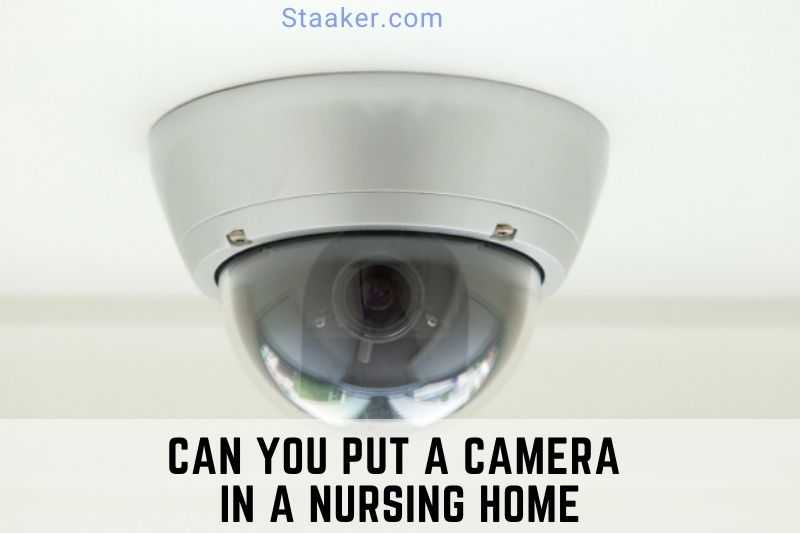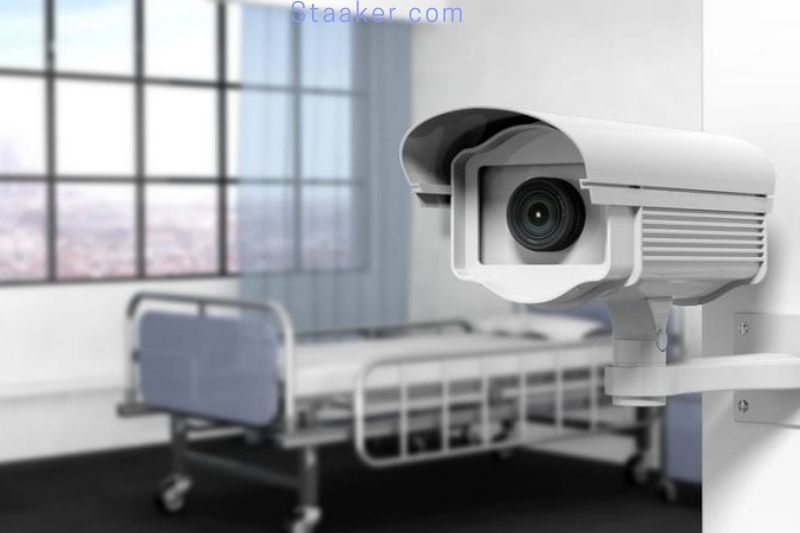As the population of aging adults grows, more and more people ask: can you put a camera in a nursing home?
The answer, it turns out, is not so simple. There are several factors to consider when deciding whether or not to install cameras in a nursing home. One key consideration in the privacy of the residents. Another The cost of installing and maintaining the cameras is the main problem.
Read this article to learn more about the pros and cons of putting cameras in nursing homes.
Is it Legal to Install a Camera in a Nursing Home?
It is dependent on the care facility. Security cameras are used at most buildings to monitor common areas, parking lots, and exits. In rare circumstances, cameras may be installed in the tenants’ rooms.
In-room cameras give family members worried about nursing home mistreatment an extra layer of protection.
However, these cameras are not permitted in every care home. Administrators at nursing homes may be hesitant to utilize them, thinking that the cameras will intrude on the privacy of employees and other residents.
Family members may install hidden security cameras to watch their loved ones in these situations.
According to the medical journal Annals of Long-Term Care, there is currently no federal legislation allowing the use of cameras in nursing homes. Over 25 states, on the other hand, have either enacted or are contemplating legislation that will allow these cameras.
Statistics on Nursing Home Abuse to Consider
Before delving into video cameras in nursing homes, it’s helpful to have some background information about these facilities.
According to the Centers for Disease Control and Prevention (CDC), 15,600 nursing homes with 1.7 million licensed beds in the United States in 2016. The primary purpose of about 70% of these nursing homes is to make a profit.
This indicates that the owners of these residences are primarily concerned with the bottom line. This frequently results in understaffed facilities that do not provide excellent treatment.
Abuse and neglect of the elderly is a significant public health issue in the United States. The statistics on nursing home abuse in Arizona are alarming. In 2021, there were 5,225 claims of abuse and 7,473 allegations of neglect, according to Arizona Adult Protective Services (APS). Compared to the previous year, claims of neglect climbed by 28%.
Miller Kory Rowe LLP is well-versed in Arizona nursing facility abuse statistics, and we have assisted many of these victims in obtaining justice. Contact our team if you fear this is happening to a senior loved one in an Arizona care facility. We provide no-cost consultations.
Should Nursing Homes Have Cameras?
It would help if you examined the advantages and disadvantages of using a nursing home camera before deciding.
Advantages of Using Cameras in Nursing Homes
Abusers might be caught on camera, providing evidence to report nursing home abuse.
Here are some examples of nursing home mistreatment that were caught on camera:
- A health care worker was caught on camera twisting a resident’s arm in 2019. The camera had been installed with the agreement of the nursing facility in this case. The employee was not a nursing home staff member but instead worked for a blood-drawing company. The individual was terminated from his position and is now facing criminal accusations.
- Hidden camera footage from 2012 shows two nursing home employees in Oklahoma forcing a latex glove into the mouth of a 98-year-old resident. As a result, families can now lawfully utilize cameras in the nursing homes in Oklahoma.
- According to court filings, a concealed camera captured a nursing home employee sexually abusing a disabled person in July 2019. Second-degree rape charges have been filed against the employee.
- Cameras can reassure families that their loved one is being looked after. A woman in New Jersey used a webcam to keep an eye on her dying spouse. She didn’t have to worry about catching abuse because she knew the staff was taking care of her husband’s needs.
- Secret cameras can be disguised as small fans, cell phone chargers, photo frames, and other items to evade detection. Family members can use the cameras to get a complete picture of the room and ensure that their loved one is secure.
Disadvantages of Using Cameras in Nursing Homes
Due to privacy concerns, some nursing facilities oppose using cameras in residents’ rooms.
Nursing home cameras have the potential to intrude on the privacy of:
- The resident: Some elders may object to having a camera recording their every move. Depending on where the camera is placed, it may capture inhabitants changing, bathing, or using a bedpan.
- Their roommates: Individual rooms for each resident are not available in all nursing homes. Roommates could be caught on video while bathing or getting dressed in a nursing home webcam used to monitor a resident.
- According to research published in the Annals of Long-Term Care, cameras can enhance employee discontent and lead to false allegations. If a camera captures a staff member moving a resident’s object, it may appear that they stole it when they relocated it off-screen.
- Furthermore, a resident may be taken from the nursing home if a camera is discovered, and you may face charges, depending on local and state regulations.
Which States Permit the Use of Cameras in Nursing Homes?
14 states will allow private cameras in elderly homes by 2022.
The following states allow cameras in nursing homes:
- Connecticut
- Illinois
- Kansas
- Louisiana
- Maryland
- Minnesota
- Missouri
- New Jersey is a state in the United States.
- New Mexico is located in the United States.
- Ohio
- Oklahoma
- Texas
- Utah
- Washington
According to OZY, a publication created by former journalists, over a dozen other states are exploring legislation to enable nursing facility cameras in residents’ rooms.
Some states employ recommendations and initiatives rather than laws to keep inhabitants safe. If a family suspects their loved one is being abused, New Jersey, for example, lends hidden cameras to them for 30 days. A comparable program exists in Wisconsin.
While these measures can help citizens stay safe, the requirements differ by state. Nursing homes in Maryland, for example, have the authority to refuse requests for in-room cameras. Other states presently prohibit the use of hidden cameras in nursing homes.
The Future of Nursing Home Cameras
As new regulations concerning nursing home cameras are reviewed, legislators must balance resident safety and privacy.
Some legislation tries to address both issues. Esther’s Law, named for Esther Piskor and inspired by her, took effect in March 2022. With the resident’s approval (or their family) and any roommates involved, this Law allows cameras in nursing homes.
If the roommate (or their family) refuses to allow a camera, the nursing home must assist the resident who wants one in relocating to a different room.
If you want to install a camera in a care home, contact:
- Your family and friends: Describe why you believe a camera is required and how it can be beneficial.
- Roommates and their families: Obtaining the cooperation of roommates and their families can alleviate any privacy issues. Demonstrate how a camera in the room can safeguard the roommate from being abused or neglected.
- Staff at the nursing home: If you ask, some care homes may allow you to install a camera. Describe your worries and why you believe a camera is required.
- Local law enforcement: Knowing your local regulations will help you determine whether nursing care cameras, including hidden cameras, are permitted in your state.
More regulations allowing cameras in long-term care institutions are being proposed or passed in response to nursing home abuse. More states may allow cameras in nursing homes to keep residents secure as technology advances (and the number of older adults grows).
FAQs
Is it permissible for me to install a camera in my mother’s memory care facility?
According to an item on the NBS San Diego website, California has established new standards allowing in-room cameras in assisted care homes as long as the patients and their families agree.
Is it permissible to install a camera in a hospital room?
Because these locations are exposed to the public, healthcare facilities are legally permitted to install security cameras. However, only authorized persons should examine the footage because recordings may contain PHI or other sensitive information.
Is it possible to install a hidden camera in a nursing homeroom?
Family members may install hidden security cameras to watch their loved ones in these situations. According to the medical journal Annals of Long-Term Care, there is currently no federal legislation allowing the use of cameras in nursing homes.
Related Post:
- How To Spot A Fake Security Camera: Top Full Instruction 2022
- How To Block Neighbors Security Camera: Top Full Instruction 2022
- How To Hide A Camera In A Wall: Top Full Instruction 2022
Conclusion
In general, it is not easy to put cameras in nursing homes. There are several factors to consider, including the privacy of the residents and the cost of installing and maintaining the cameras.
In addition, it is hard to determine which areas need additional surveillance. As the population of aging adults grows, more nursing homes will likely install cameras to keep residents safe and protect their privacy. Staaker.com hopes this information was helpful.








